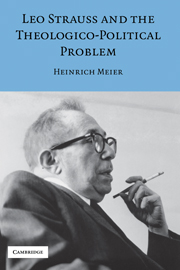Book contents
- Frontmatter
- Contents
- Preface to the American Edition
- I THE THEOLOGICO-POLITICAL PROBLEM: ON THE THEME OF LEO STRAUSS
- 1 The Theologico-Political Problem
- 2 On the Genealogy of Faith in Revelation
- 3 Death as God: A Note on Martin Heidegger
- II THE HISTORY OF PHILOSOPHY AND THE INTENTION OF THE PHILOSOPHER: REFLECTIONS ON LEO STRAUSS
- III WHAT IS POLITICAL THEOLOGY?
- IV WHY POLITICAL PHILOSOPHY?
- APPENDIX: TWO UNPUBLISHED LECTURES BY LEO STRAUSS
- Index of Names
3 - Death as God: A Note on Martin Heidegger
Published online by Cambridge University Press: 05 March 2013
- Frontmatter
- Contents
- Preface to the American Edition
- I THE THEOLOGICO-POLITICAL PROBLEM: ON THE THEME OF LEO STRAUSS
- 1 The Theologico-Political Problem
- 2 On the Genealogy of Faith in Revelation
- 3 Death as God: A Note on Martin Heidegger
- II THE HISTORY OF PHILOSOPHY AND THE INTENTION OF THE PHILOSOPHER: REFLECTIONS ON LEO STRAUSS
- III WHAT IS POLITICAL THEOLOGY?
- IV WHY POLITICAL PHILOSOPHY?
- APPENDIX: TWO UNPUBLISHED LECTURES BY LEO STRAUSS
- Index of Names
Summary
At the end of his lecture “Reason and Revelation,” immediately following the eleven steps of the genealogy of faith in revelation, Strauss considers three possible objections to his sketch. The first concerns the problem of the presence of God or the experience of the call. In that context, Heidegger's name comes into play in an unusual way. The problem of the presence and the call is not characteristic of the Bible, Strauss remarks succinctly. The phenomenon under consideration is not confined to the monotheistic faith in revelation. What is at issue, in other words, is not the experiences or the interpretations of experiences for which historical uniqueness is claimed – as it is for the revelation that took place in the past, for the divine law or the commandment that requires absolute obedience. Regarding the asserted presence of God or the call that people believe themselves to hear, what is at issue is not unique events that – if a link to nature is to be shown – first require a genealogical reconstruction or whose explanation makes necessary the demonstration of a logic of historical transformation. What, Strauss asks, was the presence of the god Asclepius in Athens, for example? Hallucination. Then he notes: “Cf. also C. F., Heidegger: God is death.”
- Type
- Chapter
- Information
- Leo Strauss and the Theologico-Political Problem , pp. 45 - 52Publisher: Cambridge University PressPrint publication year: 2006
- 2
- Cited by

